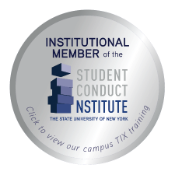Engaging Today's Students For Tomorrow's Success
Mission:
Student Affairs is committed to the holistic development and well being of our students and to providing a safe community that celebrates human differences and promotes civic responsibility and citizenship.
Values:
- Collaboration
- Holistic Student Development
- Advocacy/Inclusion/Belongingness
- Responsive to Individual Student Needs
- Growth/Learning
- Excellence/Continuous Improvement
- Service
Learning Objectives:
- Sense of Belonging (citizen of the university)
- Cognitive Skills (critical thinking; technical knowledge)
- Cultural competence
- Cultural exploration
- Thoughtful and respectful engagement
- Acceptance
- Collaboration
- Social justice advocacy
- Social responsibility
- Citizenship (following the rules; aiding others)
- Community service
- Civic engagement
- Sustainability/Being a good steward of natural resources
- Wellness:
- Physical (self-care, sense of safety, positive self-image)
- Social
- Emotional (empathy; developing self and moving toward self-actualization; coping/resilience)
- Financial (literacy; self-discipline)
- Career (choosing a path that is a good fit with values/skills/interests; work ethic)
- Intellectual (knowing how to learn best, ability to focus)
- Spiritual
Sense of Belonging
In his essay entitled “From Retention to Persistence” (Inside Higher Education, 9/26/2016), respected student success expert Vincent Tinto states that there are three main factors that support student graduation: 1) perceived value of the curriculum, 2) confidence in their ability to succeed, and 3) a sense of belonging. Tinto writes,
Students have to come to see themselves as a member of a community of other students, faculty and staff who value their membership – that they matter and belong
It probably comes as no surprise that Student Affairs is in the business of making students feel welcome and included, but we are particularly intentional about how we approach this significant task. We have studied our student body to determine which populations are most at risk of not developing a sense of belonging. Our assessments have led us to focus on transfer and commuter students. A “Belonging” Committee researched the needs of both vertical (community college) and lateral (four year) transfers. The committee implemented a new Living Learning Community for transfer students last year that filled almost as soon as it was announced.
This fall all incoming first-year residential students will be sent the PERT Social Belonging for College Students survey. This evidence-based program is designed to instill in students an adaptive mindset that normalizes difficulties experienced in the transition to college and helps students feel a greater sense of belonging.
Cognitive Skills
Student Affairs is committed to complement and enhance curricular learning through co-curricular activities and the support of academic pursuits. The co-curricular transcript is an official, vetted document that allows students to track learning outcomes gained through co-curricular engagement. The co-curricular transcript aids students in articulating desirable skills sought by employers and post-baccalaureate programs. While each Student Affairs department strives to produce cognitive learning outcomes.
Cultural Competence
Cultural competence is the ability of students to understand themselves and others in order to interact with people who are different from themselves. Student Affairs strives to help students explore and accept their own and others’ cultures, engage with others thoughtfully and respectfully, practice collaboration, and advocate for social justice. Tools to practice cultural competence are presented first in orientation and through many ways that students engage with us.
Social Responsibility
Developing a sense of social responsibility means engaging in community service, activism, being a good steward of natural resources, following the rules and aiding others. Students have many opportunities to be informed and build these muscles.
Wellness

Wellness is multi-faceted and interconnected, encompassing all the components in the above image.


